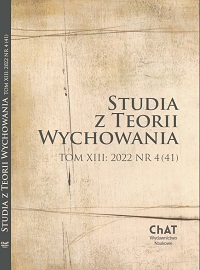„Pedagogika niepokoju” Ireny Wojnar. Perspektywa ostatnich dziesięciu lat jej pracy naukowej
„The Pedagogy of Concern” by Irena Wojnar. An outlook on the last ten years of their scientific work
Author(s): Agnieszka Izabela PiejkaSubject(s): Social Sciences, Education
Published by: Wydawnictwo Naukowe ChAT
Keywords: concern; alternative thinking; ambivalences; culture of peace; humanism
Summary/Abstract: The aim of this article is to summarize the pedagogy of concern – a proposal, which Irena Wojnar described as a “programmatic theme” that delineates the areas of research she has been involved in over the last decade of her scientific work. This proposal is less well known in the educational community than the theory of education through art with which I. Wojnar has spent most of her academic career. In the meantime, it was the idea of the pedagogy of concern that organised the scientific thinking and research work of I. Wojnar in the last decade of her life. In this article, I will discuss the conceptual categories that are crucial for the pedagogy of concern. These are: concern, pedagogical concern, alternative thinking, ambivalence, culture of peace. At the end of the article I focus on the most important demands of humanistic education, which according to I. Wojnar was a result of pedagogical concern. These are indications for the formation of a so-called “soft humanity” – a sensitivity for others and for the community, an alternative and ambivalent way of thinking, an openness to being different and peaceful togetherness. The main point of reference for me are the publications of I. Wojnar, which appeared in the years 2011 – 2021, as well as the series of eleven conferences („Humanistic Alternatives”) organised by the I. Wojnar in the Prognoz Committee “Poland 2000 Plus” at the Presidium of the Polish Academy in the years 2015 – 2020. Celem niniejszego artykułu jest syntetyczne zaprezentowanie „pedagogiki niepokoju” – propozycji, którą Irena Wojnar uznała za „temat programowy”, wyznaczający obszary badawcze, którymi zajmowała się w ostatnim dziesięcioleciu swojej pracy naukowej. Propozycja ta nie jest znana w środowisku pedagogicznym tak dobrze, jak teoria wychowania estetycznego, którą I. Wojnar zajmowała się przez większość swojej akademickiej kariery. Tymczasem to właśnie idea pedagogiki niepokoju w swoisty sposób organizowała naukowe myślenie i pracę badawczą I. Wojnar w ostatnim dziesięcioleciu jej życia. W artykule omawiam kategorie pojęciowe, kluczowe dla pedagogiki niepokoju. Są to: niepokój, pedagogiczne zaniepokojenie, myślenie alternatywne, myślenie w kategoriach ambiwalencji, kultura pokoju. W zakończeniu artykułu koncentruję się na najważniejszych postulatach edukacji humanistycznej, która według I. Wojnar była konsekwencją pedagogicznego zaniepokojenia. Są to wskazówki dotyczące kształtowania tzw. „miękkiego człowieczeństwa” - wrażliwości na innego i na wspólnotę, alternatywnego i odwołującego się do ambiwalencji myślenia, otwartości na odmienność i pokojowe współistnienie. Podstawowym punktem odniesienia, są dla mnie publikacje I. Wojnar, które ukazały się w latach 2011 – 2021 a także cykl jedenastu konferencji Humanistyczne alternatywy, organizowanych przez Profesor w Komitecie Prognoz „Polska 2000 Plus” przy Prezydium PAN w latach 2015 -2020.
Journal: Studia z Teorii Wychowania
- Issue Year: XIII/2022
- Issue No: 4 (41)
- Page Range: 457-470
- Page Count: 14
- Language: English

